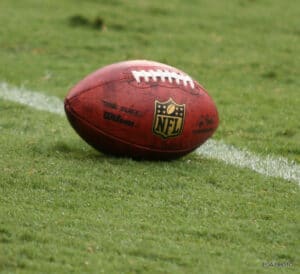
Searching for sports careers can be stressful and feel like an unwinnable game for many. You’ve probably submitted hundreds of applications, researched dozens of companies, spent hours on the phone with hiring managers, and you’re sick of ironing that same ‘power’ suit that seems to have lost its magic. But you don’t have to feel like the Cleveland Browns every time you try to win a job offer.
In fact, the NFL can teach you a lot about what sports careers suit you best and how to manage your professional life. It doesn’t matter if you’re looking for entry-level sports jobs, hoping to land an executive role, or looking to make a career change. The NFL offers a lot of career management advice.
Here’s what the NFL can teach you about sports careers and the job search:
Look for Sports Careers with Growth
As arguably the best quarterback of all time, Tom Brady’s career path shows us the importance of finding an employer who invests in their employees and helps them grow. He has stayed with the Patriots since he was drafted in 2000 and has earned four Super Bowl championships and appeared in 11 Pro Bowls.
It’s not surprising that job seekers are motivated by the idea of growth. Towers Watson’s 2014 Global Workforce Study found that career advancement opportunities are among the top driving forces for employees, according to more than 32,000 respondents.
So when you find a company in the sports career you want, look for growth opportunities and pursue them. Research their vision for the future and determine how you can be a part of it.
Stay Healthy
Your health is most important when you’re pursuing sports careers. When you don’t make your well-being a priority, you will suffer setbacks both in health and happiness and in your professional life.
In 2014, the Cleveland Browns drafted Johnny Manziel in the first round. He won the Heisman Trophy in 2012 and looked to be a standout quarterback in the NFL. Now he is left unemployed, thanks to his alleged addiction issues.
Manziel’s story is a cautionary tale — one of a rising talent who lost track of his values and slipped into unhealthy lifestyle habits.
To keep yourself on track, engage in hobbies that are healthy and fun. The April 2014 issue of the Journal of Occupational and Organizational Therapy published a study that found professionals who frequently engaged in creative hobbies tended to score higher on workplace performance rankings than those who did so occasionally.
In addition, hobbies that were unrelated to the participants’ jobs actually had greater impacts on their work performance. Find healthy outlets for yourself. Join a run club, learn how to play guitar, or teach yourself a new language. These types of hobbies are important for your health and your career. And a health professional is a successful one.
Exercise Professionalism
Professionalism is crucial in the workplace. In fact, an April 2014 report from the National Association of Colleges and Employers (NACE) found that companies listed professionalism in the top four competencies they consider to be essential in their candidates.
A major part of being professional in the workplace involves self-regulation. Professionals stay calm under pressure and maintain a stable demeanor to address a problem. They also show respect for others and don’t let their own emotions or needs impact how they perform their job or interact with people.
Sometimes, in professional sports, there are a lot of instances where athletes lose a sense of their professionalism. In 2015, Dallas Cowboys defensive end Greg Hardy arrived late to practice and missed several team meetings, which may have led to his reduced playing time. On top of this, the Cowboys were dealing with Dez Bryant after he yelled at reporters in the locker room.
Whether you’re in the workplace, engaging in professional networking, or doing any job search activity like interviewing or attending career fairs, make sure you stay professional. Punctuality is just the start. You need to show up on time, show your passion and enthusiasm, and prove yourself worthy of an opportunity.
Also, always be respectful of your teammates and colleagues. Understand that your actions will affect them. In Bryant’s case, he caused a media storm that was distracting. It’s best not to allow your emotions to impact your work ethic.
Be Accountable
As media often stirs up questions of accountability, it’s best not to pass the buck but instead own up to shortcomings and learn personal accountability, which is what the Indianapolis Colts are dealing with.
The Colts have struggled, and people are wondering who is to blame. A strong leader would step up and take the blame, then present solutions. Ryan Grigson and Chuck Pagano have yet to do that.
So as a job seeker, know what it takes to be a leader and exhibit those qualities in your work and in your job search. Employers want people who can use mistakes as growth opportunities, so highlight how you encountered an obstacle, made a mistake, owned up to your actions, then delivered an effective solution. These make great points in interviews or in your cover letter.
What has the NFL taught you about managing sports careers?





